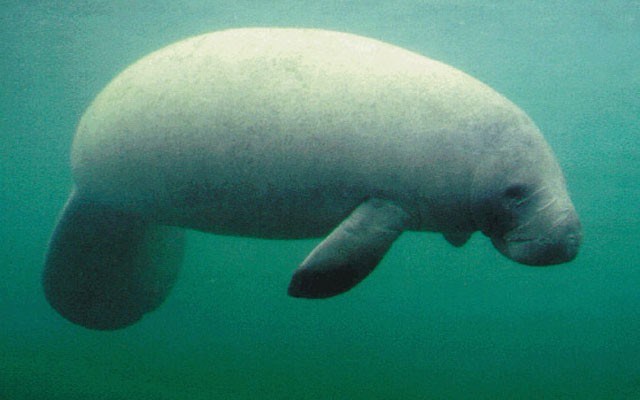What would you rather see greeting you in a town centre — a monument celebrating those who fought to uphold slavery or one memorializing a cherished manatee?
That's what Bradenton, Fla., might be dealing with if one local man gets his way (after, of course, it puts Hurricane Irma in its rearview mirror).
Earlier this summer, Floridian Anthony Pusateri launched a petition to replace the local Confederate monument with a statue of Snooty the Manatee, the oldest-known manatee who died in July at age 69. Over 14,000 people have signed in support of Pusateri's motion at www.change.org.
In his description, Pusateri explains he doesn't want to destroy the existing memorial, but hopes to find a more appropriate spot for it as opposed to its current location in front of the city's old courthouse.
Meanwhile, across the country, municipalities have taken down Confederate monuments while protesters have removed others. Here in Canada, protests have taken place in Halifax, where some argue the statue of city founder Edward Cornwallis should be removed because of his bounty on the local Mi'kmaq population. As well, the union representing Ontario's elementary school teachers has suggested removing John A. Macdonald's name from that province's buildings because of his role in implementing residential schools.
On National Aboriginal Day this year, Prime Minister Justin Trudeau renamed Langevin Block to the Office of the Prime Minister and Privy Council as Hector-Louis Langevin also had a major role in creating the residential schools system.
Opponents argue that tearing down these statues or renaming these buildings is tantamount to erasing history.
Is it, though?
It's not as though Macdonald or Cornwallis will be cleared from the history books or eliminated from museums. For better or for worse, the two men shaped a country. But the tone of the conversation certainly should change, with their city- or nation-building put in the context of these atrocities they committed and the centuries of hurt they helped create.
Though it's admittedly a less harrowing example, perhaps the sports world could be instructive in this case. Major League Baseball career hits leader Pete Rose was banned from the sport in 1989 and from the Baseball Hall of Fame in 1991 after betting on games while still a player and manager. Even though he's not celebrated, he's not forgotten. When most fans recall his name and his Charlie Hustle persona, they also remember how he compromised the sport's integrity.
(That said, the narrative around Rose continues to worsen as he has recently been accused of statutory rape dating back to the 1970s, so even if the hard-line stance toward his gambling softens, the allegations, if true, should keep celebrations of his on-field career muted.)
The worst thing we can do is forget or whitewash our country's origins. As we move forward, we must learn from this history to ensure it doesn't repeat.
Much of the conversation against change claims to be rooted in stopping the erosion of this history, but really, it's merely whinging about losing the traditionally laudatory tone of the past, that white colonizers and enslavers can do no wrong.
I don't mean to use this space to advocate one way or the other, as white people inserting themselves into another group's issue charging forth with unwelcome saviour-like action is one of the root causes of several of these problems in the first place.
In the 94 calls to action in the Truth and Reconciliation Report, there was no line imploring schools or buildings bestowing the names of problematic figures to change them, though Prime Minister Trudeau was encouraged to do so by Indigenous leaders like Assembly of First Nations Chief Perry Bellegarde and Indigenous Members of Parliament of NDP, Liberal and Independent stripes.
While there were a number of items calling on various bodies to acknowledge and apologize for their treatment of Indigenous communities, many of the calls were forward thinking, seeking changes to the education and justice systems.
Certainly, we must also do a better job teaching Indigenous history to foster greater understanding. The Truth and Reconciliation Report's calls to action included a request that the federal government "draft new Aboriginal education legislation with the full participation and informed consent of Aboriginal peoples," including "developing culturally appropriate curricula" and allowing students to receive credit for learning an Indigenous language.
Removing the symbols celebrating abusers of the past, when called upon, is an important step and shouldn't threaten anyone wishing to properly make amends. But it's a minor first step in the bigger picture.
Amid our new statues of manatees, I hope we see true progress toward reconciliation being made.




